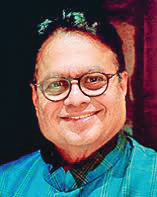
I had read a couplet somewhere which I am recalling now:
Is zubaan mein haddiyan nahin hoti,
Par isi zubaan se haddiyan
tudvayi jaa sakti hain!
The context is, of course, Rahul Gandhi. During the 2019 Lok Sabha elections, he mentioned the names of Lalit Modi, Nirav Modi and others in a meeting in Karnataka, and asked the stunning question, “Why do all thieves have Modi as their surnames?” Upset by his remark, a gentleman named Purnesh Modi approached the court. Rahul Gandhi was charged under sections 499 and 500 of the Indian Criminal Code. During the trial, Rahul was found guilty and sentenced to two years in prison by the court. After the pronouncement of sentence of two-year imprisonment, he was disqualified as a member of the Lok Sabha.
This episode has multiple dimensions. Assembly elections are to be held in Karnataka, Rajasthan and Madhya Pradesh. It will be followed by the Lok Sabha elections in 2024. In this background, how would the removal of Rahul Gandhi’s membership affect the health of Congress? Will Congress be successful in taking the issue of Rahul Gandhi’s disqualification to the people’s court? Will the opposition grow more united and powerful as a result of this? Will Congress question why Bachchu Kadu and Sudhir Parve’s membership in Maharashtra and those in other parts of the country was not terminated promptly following their conviction? Several such questions remain unanswered. The answers to these questions will be determined by the turn the current opposition takes. That is why I don’t feel there is any need to delve into these concerns and explore them now!
I believe that the issue of the propriety of language is more relevant right now. Even in general, when a disagreement arises about something, it is quite easy for people to remark that the tongue must have slipped, or that the concerned person also claims that the tongue had slipped. But does the tongue really slip? Or is it the outcome of failing to think and grasp before speaking? I still remember the words of my Babuji, veteran freedom fighter Jawaharlal Darda and my mother. Both of them used to say that when you speak, you should think about what you’re saying. What effect will your words have? Nobody will be hurt! Almost every parent teaches this to their children. Regardless, if a mistake is made, it is customary in the Indian Sanatan tradition to seek apology. In Jainism, there is also a specific festival of forgiveness. However, only the person who has erred is entitled to forgiveness. If you say something intentionally and then apologise, there is no justification for it. As far as politics is concerned, special attention should be given to the decency of the language because followers of the leaders walk the same path as their leader.
If the leader’s speech and words are of low quality, people who follow him will automatically adopt the same vocabulary. When I hear the language used in politics nowadays, only one couplet comes to mind:
Aajkal kahan jaroorat hain
haathon mein patthar uthane ki,
Todne wale to zubaan se hi dil tod dete hain!
When we talk about language, it is referred to as parliamentary and polite language because of its decency. Politicians are especially required to keep their language as civil as possible. Yet sadly, politics has done the most to undermine the language’s decency. This claim is not directed at any political party, but there are people in all parties who presumably do not consider the consequences of their words before speaking. Such distorted phrases are expunged from the proceedings of the House, but what about outside the Parliament? There, they attack each other as if they are diehard enemies! There are ideological differences in a democracy, but that does not justify using harsh adjectives such as killer, murderer, monster, merchant of death, poison farming, snake and scorpion. I’m expressing this for both the ruling and opposing parties. And surely, it is critical to remember that after becoming Prime Minister, a person is no longer the Prime Minister of any party but of India. Every citizen should respect the dignity of the high office.
Apart from journalism, I’ve been involved in public life for long. On the basis of my 18 years of parliamentary experience, I can say that if an atmosphere of purity is to be established in the country,
language will play a significant part in it. When a person crosses the line in order to criticise a member of another community or religion, the entire fraternity feels hurt. This hurts the social fabric. Even minor mistakes might lead to major consequences.
Our forefathers in politics understood this very well, which is why, even in the face of harsh criticism, they never abandoned the decency of the language. Even in criticism, there was a sense of respect. Regrettably, the situation is deteriorating. There is a need to be extra cautious in the matters of speech in a multifaceted, multicultural and multilingual country like India. Keep in mind that it is the language that can transform even a bitter neem tablet into honey!
Kabir Das ji stated this for all of us a long time ago:
Aisi vaani boliye,
mann ka aapa khoye,
Auran ko sheetal kare,
aapahu sheetal hoye!

The author is the chairman, Editorial Board of Lokmat Media and former member of Rajya Sabha.
vijaydarda@lokmat.com